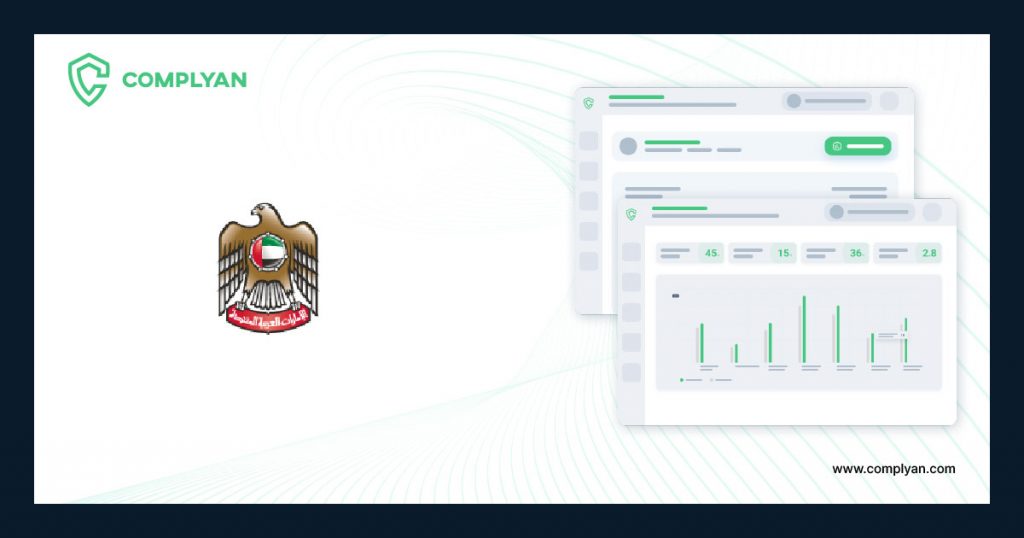A Beginner’s Guide To UAE PDPL Compliance

The protection of personal data has become increasingly critical in this digital age. With data breaches and cyberattacks becoming more prevalent, governments worldwide are taking measures to protect their citizens’ personal data. The United Arab Emirates (UAE) is no exception, having recently enacted the Personal Data Protection Law (PDPL). The PDPL aims to protect individuals’ privacy and personal data while ensuring the free flow of data within the UAE. In this beginner’s guide to the UAE PDPL compliance, we will explore the key objectives of the PDPL, the requirements for compliance, and how Complyan can help organizations achieve compliance.
What is the UAE PDPL?
The UAE PDPL refers to the Personal Data Protection Law of the United Arab Emirates (UAE), which was introduced in 2020. The law governs the processing of personal data within the UAE, and it aims to protect the privacy and rights of individuals concerning their personal data.
The PDPL requires that organizations processing personal data within the UAE obtain the consent of the data subject before collecting, using, or sharing their personal data. It also mandates that organizations take appropriate security measures to protect personal data against loss, theft, and unauthorized access or disclosure.
The law applies to both public and private sector organizations operating within the UAE. It includes provisions for data subjects to request access to and correction of their personal data. The PDPL also establishes penalties for non-compliance, including fines and potential imprisonment.
Why The UAE PDPL?
Objectives of the UAE PDPL
The Personal Data Protection Law (PDPL) of the UAE strives to safeguard people’s privacy and personal information while maintaining data freedom within the country. Its primary goals are to:
- Establish rules and guidelines for the lawful processing of personal data, including the processing of sensitive personal data.
- Protect the right of data subjects to access, amend, and delete their personal information, as well as the right to object to the processing of their data.
- Encourage openness in data processing operations and mandate that organizations get individuals’ permission before collecting or processing their personal information.
- Encourage enterprises to implement the best data protection practices and take the necessary precautions to secure personal data against unauthorized access, disclosure, or loss.
- Create the Data Protection Authority (DPA) as a regulatory body to oversee and implement the PDPL’s requirements.
- Establish punishments, such as fines, jail time, or other penalties, for failure to comply with the PDPL.
Guide to Compliance with the UAE PDPL
Here’s a beginner’s guide to the UAE PDPL compliance:
- Understand the PDPL Requirements
The first step to compliance is to understand the PDPL’s requirements. You need to know what personal data is covered, who is responsible for the compliance, what rights individuals have, and your obligations as a data controller or processor. - Appoint a Data Protection Officer (DPO)
Under the PDPL, you need to appoint a Data Protection Officer (DPO) to oversee compliance with the law. The DPO is responsible for ensuring the company’s data processing activities comply with the PDPL. Complyan can help you appoint a DPO who can guide you through the compliance process. - Conduct a Data Protection Impact Assessment (DPIA)
A DPIA is a systematic process to identify, assess, and mitigate privacy risks associated with processing personal data. Conducting a DPIA is mandatory under the PDPL for high-risk processing activities. Complyan can help you conduct a DPIA and recommend necessary measures to mitigate privacy risks. - Implement Privacy Policies and Procedures
The PDPL requires organizations to implement privacy policies and procedures to ensure that personal data is processed lawfully, transparently, and for a legitimate purpose. Complyan can help you draft privacy policies and procedures that align with the PDPL requirements. - Train Employees
Employees play a crucial role in complying with the PDPL. You must educate your employees on the PDPL’s requirements and their roles in ensuring compliance. Complyan can help you design and deliver PDPL compliance training programs for your employees. - Manage Data Subject Requests
The PDPL gives individuals the right to access, rectify, erase, and object to processing their personal data. You must have processes in place to handle data subject requests within a specific timeframe. Complyan can help you manage data subject requests and ensure you respond to them within the PDPL’s deadlines. - Review and Monitor Compliance
Compliance with the PDPL is an ongoing process. You must regularly review and monitor your data processing activities to ensure they comply with the law. Complyan can help you set up compliance monitoring programs and provide reports on your compliance status.
How Complyan Can Help Achieve the Framework’s Objectives In Your Organization

Complyan is a cybersecurity compliance management platform that focuses on assisting businesses in achieving and maintaining compliance with various cybersecurity frameworks and data protection laws, including the UAE PDPL. The following is how Complyan can assist with each of the PDPL goals:
- Defending against risks connected with processing personal data: Complyan can assist organizations in defending against risks by undertaking a privacy impact assessment (PIA). Complyan can also offer advice on how to put in place the right organizational and technical safeguards to protect personal data, including data encryption, access limits, and data retention guidelines.
- Privacy Policy Management: Complyan can assist in creating, updating, and maintaining a detailed privacy policy that appropriately represents the organization’s data processing operations. The Privacy Policy Management module offers businesses a platform for developing and disseminating privacy policies that adhere to UAE PDPL regulations. Additionally, this module ensures that data subjects can access and comprehend the privacy policies.
- Development of Information Security Policies: The Complyan information security policy builder module offers a template for developing an information security policy that adheres to the PDPL’s specifications. The policy builder module aids organizations in developing guidelines for incident management and reporting, defining the scope of the information security policy, identifying the roles and responsibilities of individuals involved in the processing of personal data, establishing procedures for the processing of personal data, and more.
By using the information security policy builder module, organizations can ensure that they have a thorough and effective information security policy in place, which is a crucial criterion for PDPL compliance. - Risk Assessment and DPIA: Complyan’s Risk Assessment and DPIA module can help organizations assess and mitigate risks associated with data processing activities. This module provides a platform for organizations to perform Data Protection Impact Assessments (DPIA) and risk assessments in compliance with the UAE PDPL. It helps identify potential risks and assess their impact on data subjects and the organization, enabling organizations to take appropriate measures to mitigate the risks and comply with the UAE PDPL.





 Governance and Policy Management
Governance and Policy Management